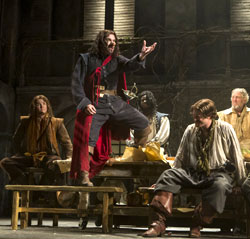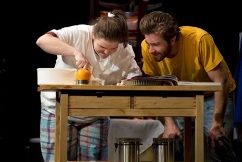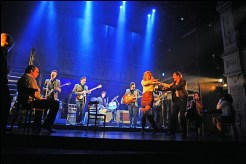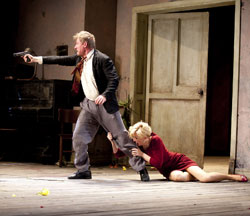Review: Cyrano de Bergerac
Oct 12th

Did Broadway really need another revival of Edmond Rostand’s 1987 romantic classic Cyrano de Bergerac a mere five years after the highly successful production starring Kevin Kline and Jennifer Garner? Not really, but this rendition by the Roundabout Theatre Company does at least provide a sterling showcase for Douglas Hodge in the title role. The veteran British actor, who won every award under the sun for his thrilling Broadway debut as Albin in the most recent La Cage Aux Folles revival, here delivers a stirring performance that is the highlight of this otherwise workmanlike production.
As usual, the Roundabout delivers excellent production values in the form of Soutra Gilmour’s lavish sets and gorgeous 17th century costume designs. But too much on display is otherwise prosaic, starting with a translation by Ranjit Bolt that, despite being in verse, sacrifices much of the work’s poeticism in a failed attempt at accessibility.
There’s a dullness that permeates the proceedings, including the bland performances by French actress Clemence Poesy, here making her Broadway debut as Roxane, and Kyle Soller, a young American actor who has spent most his career working in England, as Christian. While both performers possess the requisite good looks and handle the language well, neither delivers the sort of galvanizing turn that would fully invest us in their characters.
Among the large supporting cast, only the ever-reliable Patrick Page, recently released from his physically grueling chores as the Green Goblin in Spider Man: Turn Off the Dark, brings a stylish panache to his turn as the vengeful Comte de Guiche.
British director Jamie Lloyd has delivered a steadfast but lackluster staging that fails to fully capitalize on such fail-safe scenes as when the inarticulate Christian woos Rosalind on her balcony with Cyrano providing the romantic language.
Hodge, brandishing a impressively grotesque false proboscis, is the production’s true saving grace. He has a tendency to occasionally rush his lines and he’s both less overtly comic and tragic than such predecessors as Kline, Derek Jacobi and the Oscar-winning Jose Ferrer. But he cuts a truly dashing figure, handling both the swordplay and the florid language with consummate ease, and he’s particularly effective in conveying the character’s intense feelings of inferiority that prevent him from ever claiming the love that he rightfully deserves. He’s particularly moving in the play’s shattering final scene, when the aged Cyrano succumbs to his injuries as Roxane finally realizes that it was he who truly loved her all along. Among the matinee ladies, there wasn’t a dry eye in the house.
American Airlines Theatre, 227 W. 42nd St. 212-719-1300. www.roundabouttheatre.org. Through Nov. 25.
Review: Grace
Oct 5th

A fine cast acts their hearts out in Grace, Craig Wright’s drama now receiving its Broadway premiere. While this play about the collision between an Evangelical Christian couple and a pair of non-believers seems to have a great deal on its mind, its melodramatic plotting and artificial-sounding dialogue ultimately have little resonance.
Previously seen in productions in Washington, D.C. and Chicago, it’s set in a tacky Florida rental complex in which Steve (Paul Rudd) and his wife Sara (Kate Arrington) live next door to reclusive neighbor Sam (the white-hot Michael Shannon of Boardwalk Empire, here making his Broadway debut). Wearing a half-mask to conceal his horribly disfigured face as a result of a recent car accident that killed his wife, Sam is seen in an early, extraneous scene loudly arguing with a telephone customer service agent over the mysterious loss of his photographs from his digital camera.
Steve and Sara have recently moved from St. Paul, Minnesota, in the hopes of starting a chain of “gospel hotels” whose funding is apparently tenuous. So when Sam finally agrees to a casual social get-together, he finds himself both in a heated debate over the existence of God with the proselytizing Steven and on the receiving end of a fevered pitch to invest in his fledgling business.
Making a pair of brief but memorable appearances is Karl (television veteran Ed Asner), an elderly German exterminator who has little use for the couple’s religiosity. Derisively addressing Steve as “Jesus freak,” he explains his atheism with a harrowing account of a tragic childhood encounter with the Nazis in his hometown of Hamburg.
The play begins with a nightmarish scene in which Steve fatally shoots both Sam and his wife, with the rest told as an explanatory flashback. As the play develops, we become witness to the series of calamities—personal, business and even physical, with Steven developing a debilitating rash over most of his body—that caused him to snap.
The play includes plenty of arguments about the nature of faith, including a surprising last-minute conversion by the truculent Karl, but they seem like mere padding to the ultimately simplistic tale. It’s hard to imagine that it would have received a high-profile Broadway production without the enlistment of the starry ensemble.
That said, the actors do very well by the thin material. The always riveting Shannon brings complex shadings to his role even while wearing his Phantom of the Opera-style concealment; Rudd is convincing both in his character’s messianic zeal and his eventual derangement; Arrington is highly appealing as the wife who finds herself irresistibly drawn to her physically and emotionally scarred neighbor; and Asner makes the most of his brief but highly colorful role, adding much needed comic relief to the often stilted proceedings.
Cort Theatre, 138 W. 48th St. 212-239-6200. www.telecharge.com. Through Jan. 6, 2013.
Review: If There Is I Haven't Found It Yet
Sep 21st

Uneasily blending an examination into the global effects of climate change with dysfunctional family drama, British playwright Nick Payne’s dark comedy If There Is I Haven’t Found It Yet hasn’t quite found its footing in its American premiere by the Roundabout Theatre Company. One can only imagine the befuddled reactions the play will induce among the many young female fans of Jake Gyllenhaal, here making his New York stage debut.
The heartthrob actor plays Terry, the unkempt, slacker uncle of obese fifteen-year-old Anna (Annie Funke). Arriving for an unexpected family visit, Terry quick ingratiates himself to the troubled teen even if he proves ultimately ill-equipped to solve her myriad emotional problems.
Proving equally unhelpful to the oft-bullied girl are her parents. Her father George (Brian F. O’Byrne) is a writer/activist endlessly distracted by the book he’s working on about the devastating results of global warming, while her mother Fiona (Michelle Gomez) is a teacher who has transferred Annie to the school in which she teaches in a misguided attempt to protect her.
At first glance Terry would seem to be little help as well. Verbally maladroit except for his constant use of profanity, he’s also still deeply torn up over a recent break-up. But the friendship and attention he provides his niece at first seems to prop her up, albeit with the unintentional effect of awakening a sexual desire for her uncle.
The dramatically thin family dynamics on display are gussied up with a stylized staging by director Michael Longhurst. The stage is separated from the audience by a large moat, with the actors periodically flinging pieces of scenery into the water to ever lessening effect. And a climactic coup de theatre, while visually stunning, doesn’t justify the enormous trouble and expense it must have taken to produce it.
Gyllenhaal delivers an ingratiating turn as the prodigal uncle, and displays a convincing Cockney accent to boot. Funke is highly impressive as the body and soul-baring Anna, and O’Byrne and Gomez do the best with their underwritten roles. But despite their efforts, the evening still feels diffuse. If there any deeper meanings to be gleaned from this earnest drama, I haven’t found them yet.
Laura Pels Theatre at the Harold and Miriam Steinberg Center for Theatre, 111 W. 46th St. 212-719-1300. www.roundabouttheater.org. Through Nov. 25.
Review: Backbeat
Aug 14th

Now playing in Toronto by way of Glasgow and London’s West End—and prior to a hoped-for Broadway run—Backbeat: The Birth of the Beatles is far from the cheery juke-box musical one might expect. Concentrating on the tragic story of Stu Sutcliffe, the band’s original bassist who left the group to pursue an art career only to die from a brain hemorrhage at the age of 21, this musical adapted from the 1994 film is something of a downer despite the joyful rock music on display.
Still, there’s much here to admire, especially the profusion of meticulously recreated musical performances of the band’s original repertoire. The show concentrates on their early years, especially their residency at Hamburg’s seedy Kaiserkeller club, so expect to hear exuberant renditions of such classic rock and pop songs as “Johnny B. Goode,” “Long Tall Sally,” “A Taste of Honey” and “You Really Got a Hold on Me.”
The principal focus is on Sutcliffe (Nick Blood), who could barely play his instrument and was recruited into the band primarily because of his brooding, James Dean-style good looks and extremely close friendship with John Lennon (Andrew Knott). Although much has since been made of the exact nature of the relationship between the two similarly rebellious young men, the show handles it in a veiled, oblique fashion that proves dramatically unsatisfying.
Equally frustrating is the depiction of the central love affair between Sutcliffe and Astrid Kirchherr (Isabella Calthorpe), the beautiful young German photographer who eventually persuaded him to leave the band and follow his artistic dreams, but not before being instrumental in creating their distinctive mop-top hairstyles. As portrayed here, the two essentially peripheral figures are simply not that interesting.
Fortunately, the material’s dramatic deficiencies are compensated for by the terrific musical numbers, with the actors playing their own instruments as well as singing. The talented perfomers,, mostly imported from the original production, effectively convey the sheer joy these young men felt in their transformation from a skiffle cover band to pop music icons.
Accentuating the thinness of the main storyline is the fact the most effective scene in the show--adapted for the stage by the film’s director Iain Softley and playwright Stephen Jeffreys (The Libertine)--occurs during a lull in the action when Lennon and McCartney (Daniel Healy) are seen writing “Love Me Do.” Their beautifully written exchange perfectly conveys the contrasting artistic and personal styles that would eventually form one of the most fruitful collaborations in music history.
Other effective moments come when the band’s ambitious producer George Martin (James Wallace) fires the devastated original drummer, Pete Best (Oliver Bennett) and especially when Astrid photographs the band members. Those now iconic pictures are projected on a large screen in a wonderfully nostalgic montage that breathtakingly conveys her subjects’ photogenic charisma.
Veteran David Leveaux has staged the proceedings in admirably fluid fashion, with the action shifting back and forth between London, Hamburg and Liverpool. The show ends with a rather obvious effort to send audiences out on a high note, with an encore featuring performances of more Beatles classics that feels all too similar to the “megamixes” that have become a tired theatrical staple of pop music-themed musicals.
Royal Alexandra Theatre, 260 King St. West, Toronto, Canada. 416-872-1212. www.mirvish.com. Through Sept. 2.
Review: Uncle Vanya
Jul 24th

Leave it to the Aussies to deliver a rollicking Chekhov.
The Sydney Theatre Company’s new Uncle Vanya being presented by the Lincoln Center Festival is a triumphant rendition that thankfully highlights the humor of the classic play while not neglecting its pathos. In the hands of this talented company headed by Oscar winner Cate Blanchett as Yelena, ennui and bitter disappointment have never been so entertaining.
Hungarian director Tamas Ascher has previously directed relatively few productions in English, which perhaps explains this Chekhov veteran’s talent for delivering a production that is as intensely physical as it is verbal. There are times when the farcical goings-on verge on slapstick, but never without retaining emotional truth.
The play, which has been updated to vaguely 1950’s era Russia, is also more accessible than usual thanks to the wonderfully astute adaptation by Andrew Upton, who, along with his wife Blanchett, is the company’s co-artistic director.
The characters may be as bored, lovestruck and dissatisfied with their lives as ever, but here the play--which in lesser hands can seem depressingly lugubrious--has taken on vibrant life. Such scenes as Vanya’s (Richard Roxburgh) racing after the elderly professor Serebryakov (John Bell) with a loaded gun and Yelena’s impulsive passionate clinch with the alcoholic doctor Astrov (Hugo Weaving) are performed as wacky slapstick.
Indeed, pratfalls and physical shenanigans abound, with the late night gab session between Yelena and Sonya (Hayley McElhinney) degenerating into a giggle-filled pillow fight.
The evening is anchored by the galvanizing presence of the luminous, long-limbed Blanchett, whose Yelena displays a devastating eroticism that is only accentuated by her tense awkwardness. Attempting to restrain Vanya during his attempted shooting, she falls to the ground clutching his leg, dragged around like a beautifully coifed and gowned rag doll.
Weaving, familiar to American audiences through his memorable appearances in such films as The Matrix and the Lord of the Rings trilogy, is a particularly dashing Astrov, making his appeal to both Yelena and the forlorn Sonya more than credible.
Among the superb ensemble, standouts include McElhinney’s sensitive but steel-willed Sonya and a virtually unrecognizable Jacki Weaver (Oscar nominated for Animal Kingdom) as the elderly nanny, Marina.
The production would certainly benefit from being in a smaller house than City Center, a cavernous space far more suited to music and dance. Most of the audience will be observing the action from a distant remove, and the tricky acoustics don’t benefit the sometimes thick Australian accents, making the dialogue sometime unintelligible.
But New York audiences should be grateful for the opportunity, however limited, to see this production at all. Previously presented at Washington, D.C.’s Kennedy Center, it hadn’t scheduled another U.S. engagement until the enterprising Lincoln Center Festival had the wisdom to make it happen.
City Center, 131 W. 55th St. 212-721-6500. www.lincolncenterfestival.org. Through July 29.